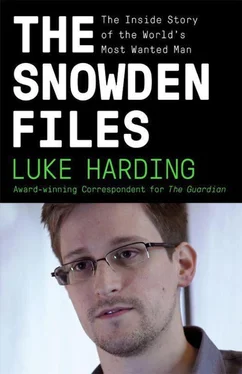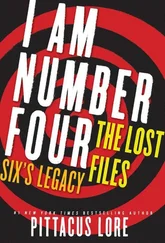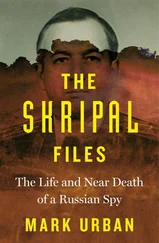Assange hatched a plan with two key elements. The first was to secure the same sort of asylum for Snowden as he had himself, from Ecuador’s populist president Rafael Correa, one of a string of leftist Latin American leaders unfriendly to US power. The second was to help get Snowden physically from Hong Kong to Quito. This was no easy thing, given that the CIA and practically every other intelligence agency on the planet were on his trail.
Assange began personal discussions with his friend Fidel Narvaez, Ecuador’s London consul. The two had become close. The goal was to secure Snowden some kind of official paper – a temporary travel document, or better still a diplomatic passport, that would speed him to the cool and grey Andes. Eventually, Assange dispatched his sometime girlfriend Sarah Harrison to Hong Kong, carrying safe-conduct papers for Ecuador signed by Narvaez. A 31-year-old would-be journalist and WikiLeaks activist, Harrison was thoroughly loyal.
Snowden’s first choice for exile had always been Iceland. He believed the island had some of the most progressive media laws in the world. But reaching Reykjavik from Hong Kong would require passage through the US, or through European states which might arrest him on the US warrant. Ecuador, on the other hand, could safely be reached via Cuba and Venezuela, who were unlikely to obey US instructions.
Unfortunately, the trip also apparently required transit through Russia.
Whose idea was it for Snowden to go to Moscow? This is the million-rouble question. Tibbo, Snowden’s lawyer, won’t answer. He says merely that the situation was ‘complicated’. Harrison says she and Snowden wanted to avoid flying over western Europe. Most connections also involved changing planes in the US, clearly not an option. Snowden’s itinerary does, however, seem to bear the fingerprints of Julian Assange.
Assange was often quick to criticise the US and other western nations when they abused human rights. But he was reluctant to speak out against governments that supported his personal efforts to avoid extradition. This was especially true of Russia. US diplomatic cables released by WikiLeaks paint a dismal portrait of Russia under Vladimir Putin. They suggest that the Kremlin, its powerful spy agencies and organised crime have grown practically indistinguishable, with Russia in effect a ‘virtual mafia state’.
And yet in 2011 Assange signed a lucrative TV deal with Russia Today (RT), Putin’s English-language global propaganda channel. The channel’s mission is to accuse the west of hypocrisy while staying mute about Russia’s own failings. The fate of Russia’s own whistleblowers was grimly evident. The list of Russian opposition journalists killed in murky circumstances is a long one. It includes the investigative journalist Anna Politkovskaya (shot dead in 2006) and the human rights activist Natalia Estemirova (abducted in Grozny in 2009 and murdered).
Assange’s view of the world was essentially self-regarding and Manichaean, with countries divided up into those that supported him (Russia, Ecuador, Latin America generally) and those that didn’t (the US, Sweden and the UK). As Jemima Khan, one of many demoralised former WikiLeaks supporters, put it: ‘The problem with Camp Assange is that, in the words of George W Bush, it sees the world as being “with us or against us”.’
On Sunday 23 June 2013, Snowden’s lanky figure, wearing a grey shirt and carrying a backpack, arrived at Hong Kong’s Chek Lap Kok airport. With him was the young WikiLeaks worker, Sarah Harrison. It was a hot and humid morning. The pair were nervous. They checked in at the Aeroflot counter for flight SU213 to Moscow, and made their way through normal departure channels. Snowden was holding the safe-conduct pass issued by Narvaez, Assange’s friend, and couriered to him by Harrison. Several plain-clothes Chinese officials observed them closely. For any CIA officers watching, this departure must have been exasperating.
In theory, Snowden’s audacious exit should have been impossible. The previous day US authorities had annulled Snowden’s US passport. They had also faxed over extradition papers to the Hong Kong authorities, demanding his immediate arrest. But Hong Kong claimed that there were ‘irregularities’ in the American paperwork, and they were powerless to halt Snowden’s departure until the errors were rectified.
Shortly afterwards, some 40,000 feet in the air, Snowden and his companion tucked into the first of their two airline hot meals. Aeroflot was working hard to overcome its past Soviet reputation for non-existent customer service. On the ground was a scene of international mayhem, as American officials discovered that Snowden had escaped the net and was en route to Moscow. The bastard had got away! For the world’s greatest superpower, Hong Kong’s not-very-plausible legalistic explanation was humiliating stuff. Not only had Snowden vamoosed, but he now appeared to be heading straight into the embrace of Washington’s adversaries – Russia, Cuba, Venezuela!
Capitol Hill made little secret of its rage. ‘Every one of those nations is hostile to the United States,’ Mike Rogers, chair of the House intelligence committee, fumed. ‘The US government must exhaust all legal options to get him back. When you think about what he says he wants and what his actions are, it defies logic.’ Democrat senator Charles Schumer was equally scathing: ‘Vladimir Putin always seems eager to stick a finger in the eye of the United States, whether it is Syria, Iran and now, of course, with Snowden.’
General Keith Alexander, the NSA’s director and Snowden’s former boss, was no happier: ‘[Snowden] is clearly an individual who’s betrayed the trust and confidence we had in him. This is an individual who is not acting, in my opinion, with noble intent.’
The Chinese, however, were unapologetic. By way of reply the official Xinhua news agency lambasted the US for its ‘hypocritical’ spying: ‘The United States, which has long been trying to play innocent as a victim of cyber-attacks, has turned out to be the biggest villain of our age.’
With Snowden safely on board the Airbus A330-300, Assange put out a statement. He claimed personal credit for the entire rescue operation. He said WikiLeaks had paid for Snowden’s ticket. While in Hong Kong, the organisation had also given Snowden legal advice. Assange would subsequently liken his role, in an interview with the South China Morning Post , to that of a ‘people smuggler’.
Proprietorially claiming Snowden as the latest star player for Team WikiLeaks, the statement said: ‘Mr Edward Snowden, the American whistleblower who exposed evidence of a global surveillance regime conducted by US and UK intelligence agencies, has left Hong Kong legally. He is bound for a democratic nation via a safe route for the purposes of asylum, and is being escorted by diplomats and legal advisers from WikiLeaks.’
Moscow journalists dumped their Sunday leisure plans and scrambled to Terminal F of Sheremetyevo International Airport, where Snowden was due to transit. The airport was named after Russia’s most celebrated aristocratic dynasty, the Sheremetevs. The Sheremetevs served numerous tsars, grew fabulously rich, and built two Moscow palaces, Ostankino and Kuskovo. Count Nikolai Sheremetev fell in love with and secretly married his former serf, Praskovya. The romance had spawned a thousand cultural histories.
A large scrum of Russian and international correspondents gathered in front of a small door. It was from here that arriving passengers would emerge; the cleverer reporters had brought pictures of Snowden to show his fellow travellers from Hong Kong.
Plain-clothes Russian agents also trawled the terminal, deflecting questions about which state agency they represented by pretending to be businessmen from Munich and journalists from state-run NTV. A Venezuelan contingent was also said to be there, fuelling speculation that Caracas could be Snowden’s eventual destination. Ecuador’s ambassador turned up, arriving at the airport in his 7-series BMW. He appeared lost as he wandered around the terminal, asking one group of journalists: ‘Do you know where he is? Is he coming here?’ A reporter replied: ‘We thought you did.’
Читать дальше












